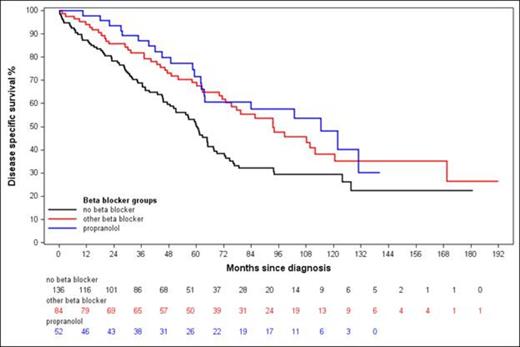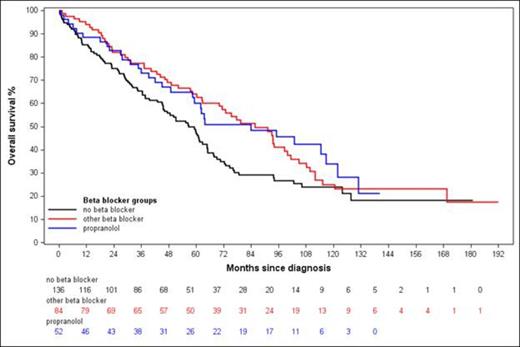Abstract

Background: A recent preclinical study revealed an antiproliferative and apoptotic effect of propranolol on MM cell lines. This study was to investigate if propranolol and other beta blocker intake improved survival in MM patients.
Methods: Among patients seen at Mayo Clinic, Rochester from 1993 to 2010, we identified those taking propranolol. Age, year of diagnosis, International Staging System (ISS), Mayo Stratification of Myeloma and Risk-Adapted Therapy (mSMART) were used as case-match variables to match propranolol users to two control populations: no beta blocker and other beta-blocker. Cox proportional hazard modeling was utilized to analyze the effect of propranolol and other beta blockers intake on overall survival (OS) and disease-specific survival (DSS).
Results: In 3 groups: propranolol (n=52), no beta blocker (n= 136), or other beta blocker (n=84), transplant eligibility was 63.5%, 66.9%, 66.7% respectively (p=0.90). Median age was 63 years. Median follow-up was 86 months. No statistically differences were seen in age, ISS, mSMART or year of diagnosis in 3 groups (p=0.46).In univariate analysis comparing propranolol vs no beta blocker or other beta blocker cohort, 5-year OS rate was 60.2% vs 47% or 64% (p=0.039), and 5-year DSS rate was 71.7% vs 50.3% or 69.1% (p=0.0029). In multivariate analysis adjusted for age, ISS, transplant eligibility, mSMART and year of diagnosis, compared to propranolol intake, no beta blocker group had poorer OS [HR= 2.081; 95% CI (1.353- 3.200); p=0.0008], and DSS [HR=2.833 (1.709-4.697); p<0.0001], but other beta blocker users had no difference in OS [HR =1.145 (0.728-1.803);p=0.56],and DSS [HR= 1.276 (0.745-2.185); p=0.38].
Conclusion: Propranolol and other beta-blocker intake among MM patients were equally associated with a more favorable OS and DSS.
Lust:Senesco: PI Other.
Author notes
Asterisk with author names denotes non-ASH members.

This icon denotes a clinically relevant abstract



This feature is available to Subscribers Only
Sign In or Create an Account Close Modal